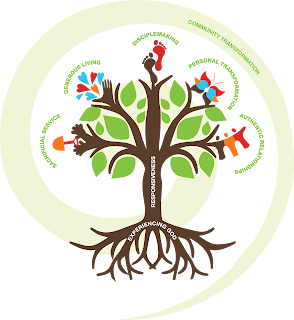(Romans 7:19, New International Version; see also Romans 7:14-20 in The Message.)
Last week I was wondering why the Christian church, whose founder decisively declared independence from the powers and principalities of this world, too often continues to give its approval to the violent decrees of those same powers.
But that's just one aspect of a larger puzzle. Why is there such a disconnect between our faith and our practice? Of course, I can point to the behavior of Christian celebrities and their abundance of adages and cliches and inspiring book titles. Many of them speak and write beautifully about sacrificial discipleship but their lifestyles are often models of affluence. Some of them are what my friend Retha once called "comfortaholics." But, really, if I'm looking for examples of inconsistency, I don't have to go beyond myself and my own choices.
Brian Zahnd's book points out that many conservative Christians of previous generations did not see a contradiction between piety and theology, on the one hand, and colonialism or slavery or Nazism on the other. It makes me wonder what connections we (I) fail to make between our faith and our daily practice.
Jesus promises abundant life but explicitly warns us not to pile up riches. Thus he sets up a fertile conversation about the meaning of "enough." He advises the rich young ruler to sell all he has and give the proceeds to the poor (Matthew 19:21; Luke 18:22). This advice gives us more than a hint that he's talking about practice, not theory. But the Bible contains no list of rules for determining the meaning of "enough" in every situation we encounter.
 |
| Source. |
I'm fascinated, although not entirely persuaded, by the process philosophers and theologians who say, among other things, that (1) God influences and persuades, but doesn't coerce, and (2) the reality we experience is a chain of indivisible events, each of which influences the next but the outcomes are not preordained. If we include personal decisions as events, and understand that God doesn't coerce these decisions, then my task at each decision point is to ask myself, Which way is God persuading me? What has God told me through the Bible, the church community, and my own rational thought, conscience, and intuition? How should I respond to this difficult person? How will I make amends for the hurt I have caused? How should I spend my money and time -- and who will benefit from and be hurt by the decisions I make? What impact will I have on our beautiful planet?
It's not that I need to plod legalistically through this checklist at each and every transaction, but I just need to take the time to see these occasions, and my participation, through God's loving eyes. I believe that if I deliberately consider how God is drawing me toward Gospel order at each of these moments of decision, I'm much more likely to "do the good I want to do."
If it's just a matter of resisting temptation with rules, I don't always do well. But if I stop and consider God's constant and loving persuasion, that helps put temptation back in its place.
A few years ago I wrote about "evangelical machismo." In contrast to celebrity heroism, I tried to define a more likely model of discipleship and its impact. I still think it's a decent description, but even this modest portrayal doesn't really deal with dilemmas of temptation: For most of us, the greater conformity to Christ will happen between the lines: we forgive more rapidly, confess and resist addictions more consistently, speak out against injustice more openly, reveal our faith more creatively, consume more judiciously, interact in our meetings and churches more transparently, assess and critique more generously, live more prayerfully. We will love more passionately, treat ourselves and others more tenderly. We will laugh and cry more often. And the upwardly reinforcing spiral will transform our world.
The testimony of simplicity, according to West Hills Friends.
Wesley the process theologian: a sample of John B. Cobb, Jr.
Why Roger Olson is not a process theologian. And why he should be.
Where do pro-life feminists belong?
A presumption of guilt.
Hiding the Palestinians no longer fools young American Jews.
Blues from Denmark:
No comments:
Post a Comment